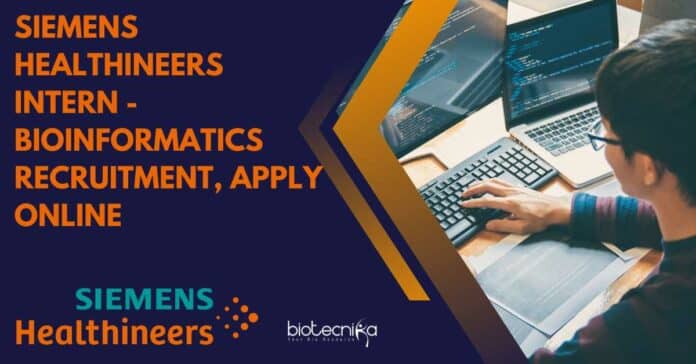Siemens Healthineers Intern – Bioinformatics Recruitment, Apply Online
Siemens Healthineers Intern – Bioinformatics Recruitment, Apply Online. Interested and eligible applicants can check out all of the details on the same below. Bachelors/ Master/ PhD in Bioinformatics/Biosciences background students who are still pursuing their degree can apply.
Possible Interview Questions for the Technical Round at Siemens Healthineers for an Intern – Bioinformatics role are posted below
Intern – Bioinformatics
Location: Bengaluru, Karnataka, India
Job ID: 369712
Organization: Center for Innovation in Diagnostics, Siemens Healthineers
Mode of employment: Intern/fixed time duration
Experience Level: Early Professional
Full Time / Part Time: Full-time
Remote vs Office: Office/Site only
Company: Siemens Healthcare Private Limited
Organization: Siemens Healthineers
Job Family: Internal Services
Intern
Introduction
Siemens Healthineers develops innovations that support better patient outcomes with greater efficiencies, giving providers confidence to meet the clinical, operational and financial challenges of a changing healthcare landscape. With over 45,000 employees Siemens Healthineers is one of the world’s largest suppliers of technology to the healthcare industry. As a global leader in medical imaging, laboratory diagnostics, and healthcare information technology, we keenly understand the entire patient care continuum—from prevention and early detection to diagnosis and treatment.
The Center for Innovation in Diagnostics
India Group of Siemens Healthineers in Bangalore, India is looking to recruit interns wanting to have real-world experience in interdisciplinary research and development in Bioinformatics. This person will be supporting bioinformatics activities associated with various molecular biology and sequencing topics. The internship duration could extend from 3 to 6 months.What are my responsibilities?
- Analyze large sequence datasets from publicly available genomic databases
- Design of primers and approaches for selective amplification
- Collect, analyze, and interpret genomics data
- Write codes/scripts to process genomic sequences and implement algorithms
- Read and understand technical literature (journal articles, publications, reports)
What do I need to qualify for this role?
- A student who has not yet graduated and working towards a relevant Bachelors/ Master/ PhD in Bioinformatics/Biosciences or equivalent discipline degree, from an accredited academic institute
- Strong theoretical and practical knowledge of molecular biology, and bioinformatics (like primer design, familiarity with standard tools, pipelines and databases used for genomic data analysis)
- Coding in programming languages (one or more of Python, R, Perl)
- If you have acquired your skills in alternative ways your application is just as well appreciated.
What else do I need to know?
Siemens is dedicated to quality, equality, and valuating diversity and we welcome applications that reflect the diversity of the communities within which we work. We are looking forward to receiving your online application. Please ensure you complete all areas of the application form to the best of your ability as we will use the data to review your suitability for the role.
Possible Interview Questions for the Technical Round at Siemens Healthineers for an Intern – Bioinformatics role:
- Can you explain your experience in analyzing large sequence datasets from publicly available genomic databases? Provide an example of a project where you utilized this skill.
- Answer: In my previous internship, I worked with a research team to analyze genomic datasets from public databases such as NCBI. One project involved identifying potential disease-associated variations by comparing the genetic data of affected individuals with a control group. I employed bioinformatics tools and algorithms to analyze the datasets, identify significant variations, and interpret their potential functional implications.
- Describe your approach to designing primers and strategies for selective amplification in molecular biology. Have you encountered any challenges in this process? How did you overcome them?
- Answer: When designing primers for selective amplification, I consider factors such as target specificity, primer efficiency, and avoiding nonspecific amplification. In a previous project, I faced challenges with primer dimers, which can hinder accurate amplification. I optimized the primer design parameters, adjusted annealing temperatures, and performed gel electrophoresis to validate the specificity and efficiency of the primers, ultimately overcoming the issue.
- How do you collect, analyze, and interpret genomics data? Can you share an example of a genomics project you have worked on and the insights you derived from the data?
- Answer: In my research project, I collected genomics data from patients with a specific disease and control samples. I employed bioinformatics tools and pipelines to preprocess the raw data, align it to the reference genome, identify genetic variants, and perform statistical analyses. By comparing the variant frequencies between the two groups, I identified potential disease-associated variations and gained insights into the genetic basis of the disease.
- Explain your experience with coding in programming languages such as Python, R, or Perl for bioinformatics tasks. Share an example of a coding project you have completed and the impact it had on your research.
- Answer: I have a strong foundation in programming languages like Python and R, which I have extensively used for bioinformatics tasks. For instance, in a project aimed at identifying differentially expressed genes in RNA-seq data, I developed a Python script that utilized packages like NumPy and Pandas to preprocess the data, perform statistical analyses, and generate informative visualizations. This automated pipeline significantly accelerated the analysis process and provided valuable insights into gene expression patterns.
- How do you stay updated with the latest advancements in bioinformatics and molecular biology? Provide examples of scientific literature you have read recently that have influenced your work.
- Answer: To stay updated, I regularly follow reputed scientific journals, attend conferences, and participate in online forums. Recently, I read a study published in Nature Genetics that described a novel algorithm for variant calling in whole-genome sequencing data. This research provided valuable insights into improving variant detection accuracy, and I incorporated some of its methodologies into my own work. Additionally, I actively engage with online bioinformatics communities to exchange knowledge and stay informed about emerging techniques and tools.
Remember to personalize your answers based on your own experiences, projects, and knowledge. Good luck with your interview!
Editor’s Note: Siemens Healthineers Intern – Bioinformatics Recruitment, Apply Online. Please ensure you are subscribed to the Biotecnika Times Newsletter and our YouTube channel to be notified of the latest industry news. Follow us on social media like Twitter, Telegram, Facebook





































